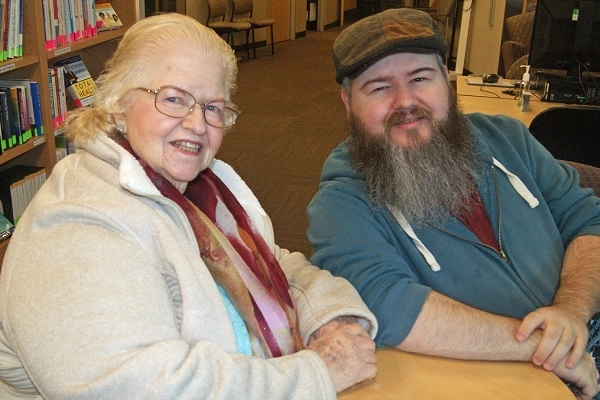Heart implant takes high-risk A-fib patients off blood-thinners


Patients with atrial fibrillation with a high risk of stroke now have more peace of mind, thanks to a tiny new implant. The device, available through local cardiologists, reduces the need for blood-thinners.
Salem Health teamed up with Cascade Cardiology and Oregon Heart Center to introduce the Boston Scientific WATCHMAN in November 2018. It’s an occlusion (closure) device for the left atrial appendage. The first two patients have passed the six-week “test,” and both no longer take anti-coagulation medication.
How it works
The WATCHMAN prevents blood from coagulating in the appendage of the heart, which means the risk of stroke associated with non-valvular atrial fibrillation (irregular heart beats) is much lower. It is placed under fluoroscopy, a form of X-ray, in a relatively quick procedure in Salem Hospital’s Catheterization Lab, to “plug” the left atrial appendage — an area where blood can pool and form clots, leading to stroke. The device, once healed and sealed into the heart, reduces the need to take long-term anticoagulants.So far, 10 cases have been successfully completed in this short time period.
Salem Health’s first two WATCHMAN patients, Barry S. and Glenda W., were good candidates because they had several risk factors for stroke and atrial fibrillation — a dangerous combination. Ashit Patel, MD, of Cascade Cardiology performed Glenda’s procedure; Barry received his implant from Matthew Fedor, MD, of the Oregon Heart Center.
Keeping up with Barry
“Barry was the perfect candidate,” says Dr. Fedor, noting Barry had an intracranial bleed in the past (brain bleed leading to stroke) along with chronic atrial fibrillation. “Barry was stuck between a rock and a hard place because if you have a history of bleeding, anticoagulants are generally not advised.”Dr. Fedor also noted that because Barry relies on a walker, he can be unsteady, and therefore at risk of falling. Falling can cause internal bleeding — a very dangerous situation for a person on blood-thinners.
Barry owned his own computer consulting business until retiring 20 years ago. Now he volunteers weekly in the “chart room” for Salem Hospital’s Mother/Baby unit. He passed his six-week test, which means his left atrial appendage is totally “healed over” with his own skin cells. This fools the blood into bypassing that dangerous pocket. Thanks to the WATCHMAN, blood is blocked from getting in and pooling.
Now, Barry just needs to follow up every six months with Dr. Fedor for his atrial fibrillation medication.
“We’re so relieved; he’s doing great and no more (blood thinner) monitoring!” said Barry’s wife Cheryl.
Jean, Barry’s fellow volunteer in the chart room, said that now she’ll have to work even faster to keep up with him.
“You’d better walk pretty fast when you’re following his walker,” she laughed.
Glenda can enjoy camping
Long-time Salem resident Glenda lives with her son James, who helps track her medications. For many years, she provided in-home day care for hundreds of children. Now she enjoys going to “the mountain.” (Her son laughingly says she means Spirit Mountain.)“Glenda was the ideal patient for the WATCHMAN device because she has a high stroke risk from A-fib,” says Dr. Patel, “and could not tolerate a blood thinner due to recurrent bleeding from her stomach.”
Glenda was very concerned about long term bleeding — but also worried about stroke if taken off blood thinners. Thanks to the WATCHMAN implant, she’s thankful to lose both concerns.
James is thankful Glenda no longer needs one of her medications – Warfarin.
Glenda also has a pacemaker now (she calls it her time piece!). When her heart rate drops — or feels “sporadic” — it kicks in. Together with her A-fib medication and the WATCHMAN, she’s getting better every day with more energy to enjoy buzzing around her favorite place – Spirit Mountain — in her electric scooter, and camping with her dogs and son. Most important, she feels confident her risk of having a stroke is low.
“This gives us peace of mind, knowing there’s one less thing to worry about with mom,” James said. “That gives us more time together, so she can do the things she loves. We’ve been staying close to home, but now we’re hoping to camp in the Redwoods this year!”